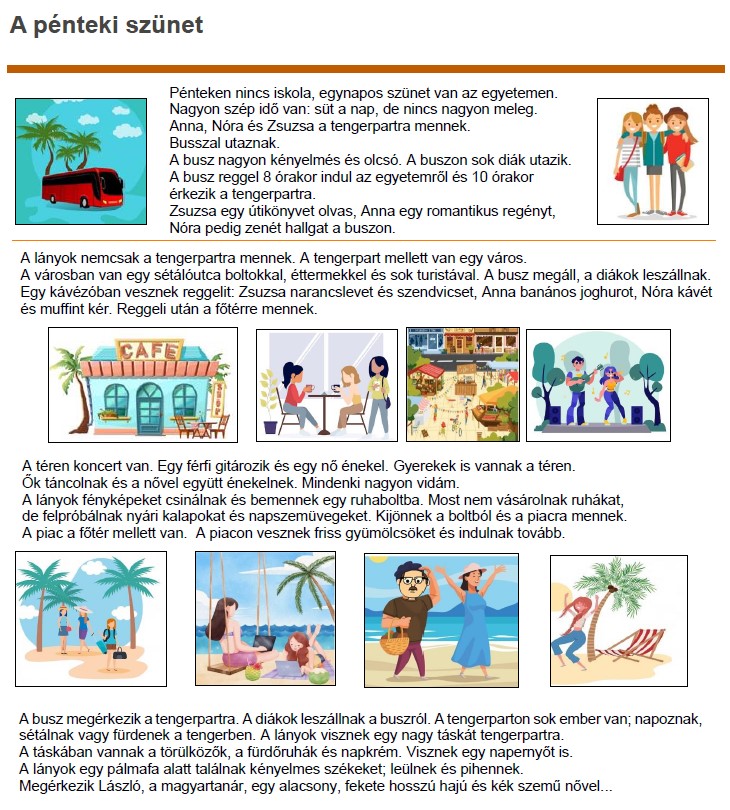Chapter 5 – Part 1- A pénteki szünet

Pronunciation warm up
Long consonants – 2
Vocabulary – Practice the pronunciation of the following words
Focus on the compound words
Keep in mind: stress is always placed on the first syllable of a word.
Reading text

Note:nouns, accusative, „irregular” verbs (group 4), + megy location endings -ra, re, ba, be + question word hova?; + jön location endings -ról, ről, ból, ből + question word hova? prefixes for locations le-fel-ki-be
Listening
audio/video – TBA
Dictation
A pénteki szünet
Reading – Read the text and learn the new vocabulary
Pénteken nincs iskola, egynapos szünet van az egyetemen. Nagyon szép idő van: süt a nap, de nincs nagyon meleg. Anna, Nóra és Zsuzsa a tengerpartra mennek. Busszal utaznak. A busz nagyon kényelmés és olcsó. A buszon sok diák utazik. A busz reggel 8 órakor indul az egyetemről és 10 órakor érkezik a tengerpartra. Zsuzsa egy útikönyvet olvas, Anna egy romantikus regényt, Nóra pedig zenét hallgat a buszon.
A lányok nemcsak a tengerpartra mennek. A tengerpart mellett van egy város. A városban van egy sétálóutca boltokkal, éttermekkel és sok turistával. A busz megáll, a diákok leszállnak. Egy kávézóban vesznek reggelit: Zsuzsa narancslevet és szendvicset, Anna banános joghurot, Nóra kávét és muffint kér. Reggeli után a főtérre mennek. A téren koncert van. Egy férfi gitározik és egy nő énekel. Gyerekek is vannak a téren. Ők táncolnak és a nővel együtt énekelnek. Mindenki nagyon vidám. A lányok fényképeket csinálnak és bemennek egy ruhaboltba. Most nem vásárolnak ruhákat, de felpróbálnak nyári kalapokat és napszemüvegeket. Kijönnek a boltból és a piacra mennek. A piac a főtér mellett van. A piacon vesznek friss gyümölcsöket és indulnak tovább.
A busz megérkezik a tengerpartra. A diákok leszállnak a buszról. A tengerparton sok ember van; napoznak, sétálnak vagy fürdenek a tengerben. A lányok visznek egy nagy táskát tengerpartra. A táskában vannak a törülközők, a fürdőruhák és napkrém. Visznek egy napernyőt is. A lányok egy pálmafa alatt találnak kényelmes székeket; leülnek és pihennek.
Megérkezik László, a magyartanár, egy alacsony, fekete hosszú hajú és kék szemű nővel.
Practice exercises
1. Three location endings – HOL? HONNAN? HOVA?
2. Prefix verbs (le, fel, ki, be, meg)
3. Put the sentences in the right order (based on the original text)
4. Put the correct word in the sentence.
Grammar Bites
1. THE VERB BASE
In most Hungarian verbs the verb base and the third-person singular of the present tense are the same. (tanul – ő tanul >> (s)he studies ) Most dictionaries verbs are given in this form and not in infinitive (tanulni >> to study)
2. THE VERB TYPES
Hungarian verbs can be divided into four major groups.
| regular verbs | -s, sz, z ending verbs | -ik ending verbs | irregular verbs |
* check the detailed conjugation charts
3. THE CONJUGATION TYPES
| indefinite conjugation | definite conjugation |
The indefinite and definite conjugations apply in the indicative, conditional, and imperative moods.
Hungarian uses endings to indicate who is doing the action. Therefore the personal pronoun (which has a similar function in English as these endings) is usually omitted. The real difficulty of the conjugation system is the determination of the “definite” and “indefinite” conjugation.
– is there a direct object in the sentence?
– if yes, is this direct object indefinite or definite?
4. THE VERB TENSES
| present | past | future |
– present tense – definite and indefinite conjugation
– past tense – definite and indefinite conjugation
– future tense – “fog”*+infinitive form of the verb (ni) – “fog” is a helping verb and it has indefinite and definite conjugated forms
Did you know? – Culture Corner
Holidays in Hungary
One of the most important Hungarian holidays is Március 15 – 15 March is the most prominent for many. It commemorates the start of the revolution of 1848 and 1849, and with it, the love for freedom of the Hungarian people.
Hungarians celebrate the following holidays:
– Nemzetközi Nőnap – International Women’s Day
– Húsvét vasárnap és hétfő – Easter Sunday and Monday
– Munka ünnepe – Május 1 – May 1st – Labor Day
– Anyák napja – 1st Sunday of May – Mothers’ Day (yes, 1st Sunday)
– Pünkösd vasárnap és hétfő – 7th Sunday and Monday after Easter – Pentecost (usually late May or early June)
– Augusztus 20 – August 20th – St. Stephen Day (Foundation of Christian Hungary)
– Október 23 – October 23rd – remembering the 1956 Revolution and War of Independence
– Mindenszentek napja – November 1st – All Saints’ Day (Christian holiday)
– Szenteste – December 24th – Holy night
– Karácsony – December 25th-26th – Christmas
– Szilveszter – December 31st – New Year’s Eve
List of the Hungarian national holidays
List of some Hungarian winter holiday traditions
Friday (adjective)
break/holiday
on Friday
one-day (adjective)
nice
weather
the sun shines
it is not very hot
they go/they are going
by bus
comfortable
cheap
(s)he travels/(s)he is travelling
at 8 o'clock
from (the) university
it arrives
guidebook
novel
(s)he listens to music/(s)he is listening to music
not only
town, city
pedestrian shopping street
with shops
with restaurants
with (a) tourist
it stops
they get off
they buy/they are buying
breakfast
orange juice
banana (adjective)
yoghurt
muffin
(s)he asks for
after breakfast
to the main square
on the square
(s)he plays the guitar
(s)he sings
kids, children
there are
together
they sing/they are singing
everyone
happy
they take photos
they go in/they enter
to (a) clothing store
they don't buy
clothes
they try it on
summer (adjective)
hats
sunglasses
they come out
from a store
to (the) market
market
main square
they move on
it arrives
to (the) beach
they sunbathe/they are sunbathing
they walk/they are walking
they bathe/they are bathing
in (the) sea
they carry a big bag
towels
swimwear
sunscreen
sun umbrella
they find
chairs
they sit down, take seats
short
long-haired
blue eyed
